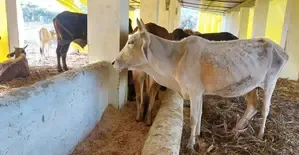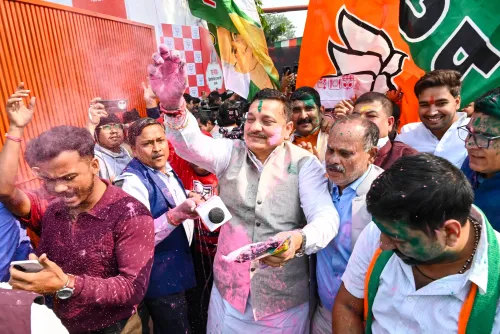Gujarat Takes Action Against Unauthorized Cattle Owners in Vadodara

Synopsis
Key Takeaways
- VMC launches operations against unlicensed cattle.
- Inspections conducted in Bapod area.
- 18 teams formed to capture stray livestock.
- Efforts to mitigate urban hazards from stray cattle.
- Economic implications of unregulated cattle populations.
Vadodara, Feb 27 (NationPress) The Vadodara Municipal Corporation (VMC) in Gujarat has ramped up its efforts against unauthorized cattle owners as of Thursday.
Teams from the VMC, supported by officers from the Bapod Police Station, performed inspections in the Bapod region, focusing on cattle sheds that were housing untagged animals.
This initiative comes in response to recent occurrences where stray cattle have resulted in fatalities, leading the municipal body to establish 18 teams focused on capturing wandering livestock.
During the inspections, confrontations occurred as cattle owners resisted the officials' access to their private properties.
The VMC's enforcement actions will persist for the upcoming three months, with the goal of ensuring compliance and minimizing the dangers posed by stray cattle in the urban environment.
In Gujarat, the topic of unauthorized cattle has emerged as a major concern, especially in metropolitan regions.
In Ahmedabad, the municipal corporation (AMC) informed the High Court that it had successfully cleared 90 percent of the city's streets of stray cattle. This initiative resulted in the voluntary relocation of 14,858 animals from the city within a span of ten days, while 519 unclaimed bovines were transferred to panjrapols (animal shelters) located outside urban areas.
Despite these endeavors, the AMC has issued only 17 licenses to cattle owners, turning down 114 applications due to insufficient space for accommodating the animals.
The existence of unlicensed cattle exacerbates the stray cattle population, creating obstacles for both urban management and public safety. A study conducted by the Gujarat State Legal Services Authority (GSLSA) indicated that stray cattle are present in every city and town throughout the state, prompting the High Court to instruct state authorities to implement strategies to tackle this issue.
The presence of unlicensed cattle not only impacts urban infrastructure but also carries economic repercussions. For example, during the lumpy skin disease outbreak in 2022, Gujarat experienced a decline in milk collection by around 100,000 liters per day in certain areas, underscoring the economic impact of unregulated cattle populations.









